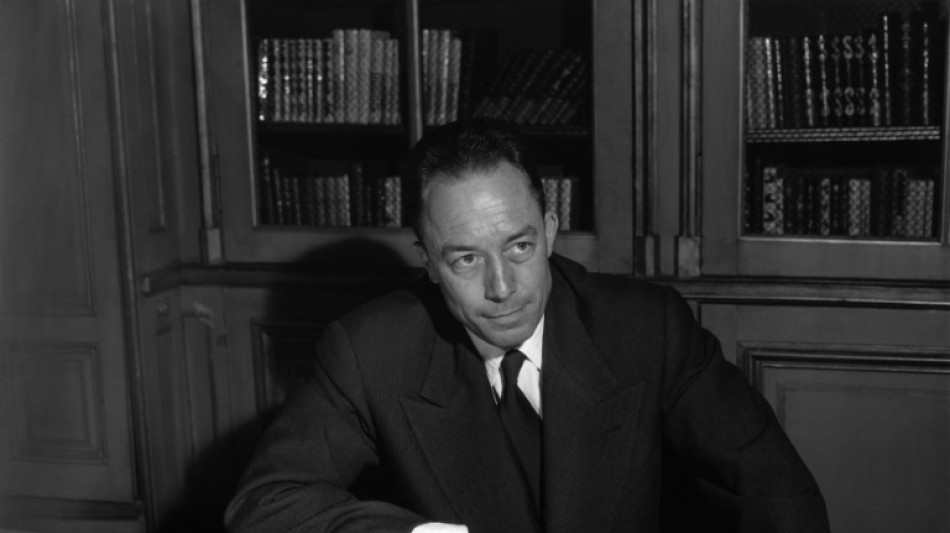

From novelist to influencer: the many sides to Albert Camus
The premiere of "The Outsider" at this year's Venice Film Festival brings to the screen one of the world's most read novels, penned by French author Albert Camus, a star in his day and now.
Winner of the Nobel prize three years before his tragic death in 1960 at the age of 46, Camus has found new admirers in younger generations who love to quote him in rap lyrics and on social media.
Here we look at five different faces of the writer whose opening to "The Outsider" -- "Mother died today. Or, maybe, yesterday; I can't be sure" -- has become a classic of the modern novel.
- Influencer -
Camus penned those famous lines to his first novel at the age of 29. Translated into nearly 70 languages, it is the bestselling book in mass market paperback format in France.
French director Francois Ozon is not the first to adapt the novel; Italian maestro Luchino Visconti's version starring Marcello Mastroianni as the protagonist Meursault, came out in 1967.
But the story -- an existential tale of a young man apparently indifferent to the deaths of his mother, the Arab he murders, and his own as punishment for the crime -- has not yet inspired Hollywood.
Still, it has been staged and turned into comic books including a Japanese manga, all keeping the novel alive for contemporary audiences.
Indeed, on social media Camus is all the rage, with passages from "The Outsider" going viral and #camus or #absurd frequently trending on TikTok.
The author's words have inspired musicians including Nick Cave, Tom Waits and Radiohead as well as rap artists Gael Faye, Abd al Malik and Oxmo Puccino.
- Libertarian -
"I rebel; therefore I exist", wrote Camus in his 1951 essay "The Rebel", a phrase that summed up his approach to politics.
He was outspoken about certain issues but steered clear of organised parties, notably warning the left of the threats of totalitarianism.
His links with the Communist Party were short-lived and he found himself isolated him from the Paris intellectual circle.
His famous friendship with Jean-Paul Sartre ended publicly and acrimoniously in 1952, when Sartre wrote a scathing review of "The Rebel".
- Abolitionist -
"There will be no lasting peace either in the heart of individuals or in social customs until death is outlawed," wrote Camus in the conclusion to his essay "Reflections on the Guillotine" (1957).
He campaigned for a ban and spoke out against Algerians sentenced to death by France during the Algerian war.
His actions later served as a model for lawyer Robert Badinter in 1981 when as justice minister he led the vote to end the practice in France.
- Romantic -
Camus appeared reserved but was a charmer who loved theatre and dancing.
"Sartre needed a few hours of phenomenology and a lot of whisky to seduce a student, whereas all Camus had to do was turn up and smile," said French author Frederic Musso, quoted in Le Figaro.
Married with two children, he openly led a double life, maintaining a passionate affair for more than a decade with the Spanish actress Maria Casares.
"I love you as one loves lightning in the sky, furiously, unable to hold onto it," he wrote to her in their passionate correspondence, published in 2017.
Another great love was football. He played for his university team in Algiers.
"What I know about morality, I owe it to football," he wrote in "The First Man", his autobiographical novel published posthumously in 1994.
- Unlucky -
As a cruel illustration of the absurdity of existence at the heart of his philosophy, Camus's death on January 4, 1960, was not only a terrible accident but also the result of decisions made at the last minute.
After spending New Year's Eve at his home in Provence he was due to return to Paris by train with his wife Francine and their twins.
Tired, he instead accepted the invitation of his publisher Michel Gallimard to go by car.
They were travelling at 145 km/h on a main road when Gallimard lost control, smashed into a first tree, then a second. Camus was killed instantly.
In the trunk sat the unfinished manuscript of "The First Man"; in Camus's pocket, his unused train ticket.
宋-H.Sòng--THT-士蔑報




